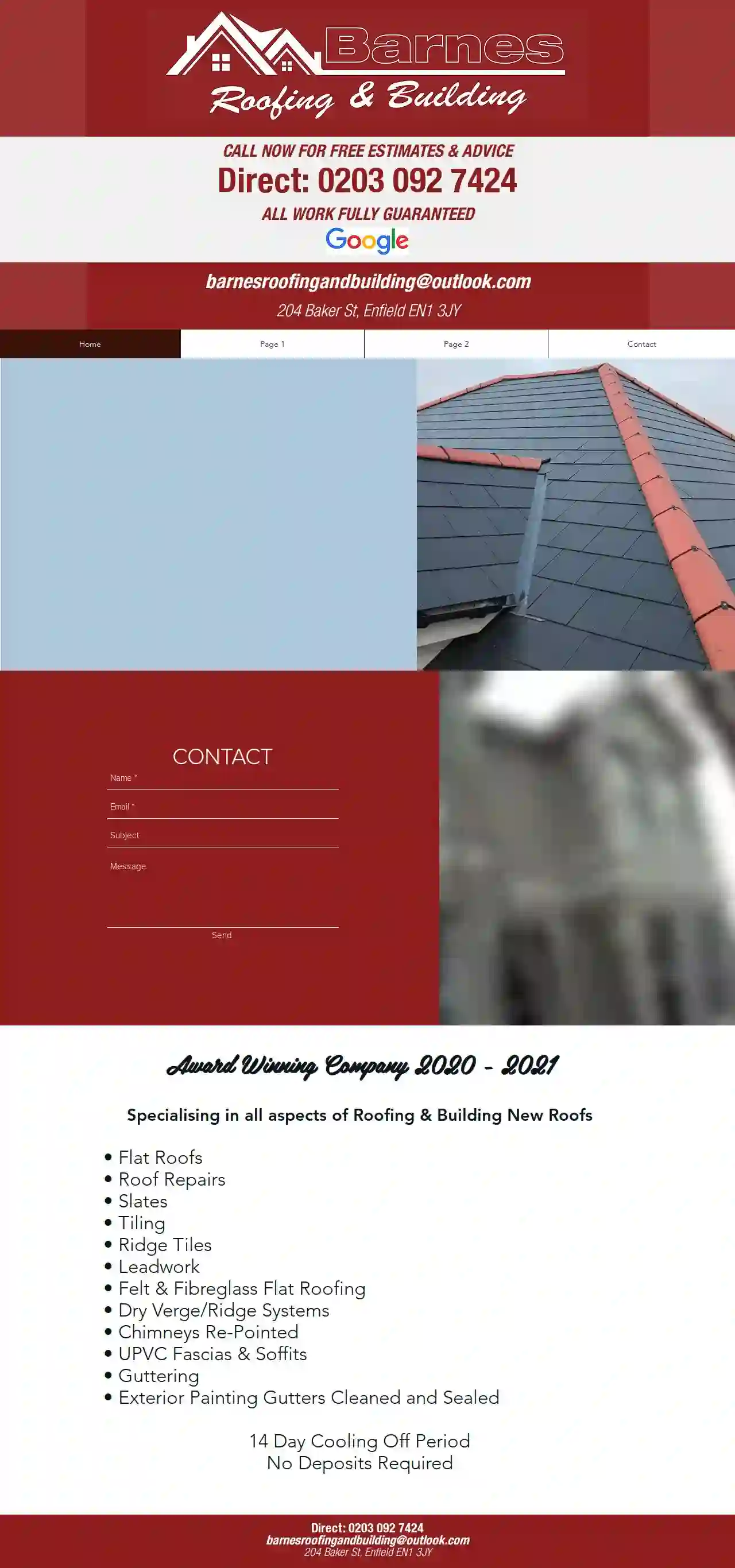Industrial Roofing Contractors Islington
Find the best Industrial Roofing Contractor in Islington
Receive 3 FREE Industrial Roofing Companies quotes for your project today! Compare profiles, reviews, accreditations, portfolio, etc... and choose the best deal.

Barnes Roofing & Building
4.39 reviews204 Baker St, Enfield, EN1 3JY, GBAward Winning Company 2020 - 2021. Specialising in all aspects of Roofing & Building New Roofs. We offer a wide range of services including Flat Roofs, Roof Repairs, Slates, Tiling, Ridge Tiles, Leadwork, Felt & Fibreglass Flat Roofing, Dry Verge/Ridge Systems, Chimneys Re-Pointed, UPVC Fascias & Soffits, Guttering, and Exterior Painting. Gutters Cleaned and Sealed. 14 Day Cooling Off Period. No Deposits Required.
- Services
- Why Us?
- Gallery
Get Quote
London Platforms Roofing - High Level Roof Repair | 24/7 Emergency Roof Repair
4.229 reviews26-28 Burleigh Road, Enfield, EN1 1NY, GBLondon Platforms Roofing is a roofing company that provides a wide range of domestic, commercial, and industrial roofing solutions across London and the Home Counties. We pride ourselves on providing our customers with high-quality roofing services, using our unique fleet of lorries with cherry pickers to reach and fix roofs up to 35 meters high. Our team is passionate about roofs, knowing exactly what it takes to ensure quality and restore trust in the roofing industry.
- Services
- Why Us?
- Accreditations
- Gallery
Get Quote- Lo
London Roofing Group
4.45 reviewsLondon, GB- Services
- Why Us?
Get Quote - E.
E.J. Roberts Roofing Ltd
3.510 reviewsLondon, GB- Services
- Why Us?
Get Quote - Ra
Rankins Roofing and Building
4.610 reviewsLondon, GB- Services
- Why Us?
Get Quote - AR
ARK Roofing and building Ltd
412 reviewsLondon, GB- Services
- Why Us?
Get Quote - Pr
Property Group Roofing & Building Ltd
49 reviewsLondon, GB- Services
- Why Us?
Get Quote - Fe
Felt Roofing Systems
2.86 reviewsLondon, GB- Services
- Why Us?
Get Quote - AR
ARMOURED ROOFING LTD
55 reviewsLondon, GB- Services
- Why Us?
Get Quote - Oa
Oakley Roofing And Guttering Ltd
3.65 reviewsLondon, GB- Services
- Why Us?
Get Quote
Over 12,314+ Roofers registered
Our roofing experts operate in Islington and beyond!
Roofyng.co.uk has curated and vetted the Best Roofing Companies in and around Islington. Find the most reliable contractor today.
Industrial Roofing FAQs
- Regular Inspections: Conduct inspections at least twice a year, or more frequently in harsh environments, to identify any issues early.
- Prompt Repairs: Address any damage or leaks immediately to prevent further deterioration.
- Debris Removal: Keep the roof clear of leaves, branches, and debris that can trap moisture and cause damage.
- Gutter Cleaning: Ensure gutters and downspouts are clear of debris and functioning correctly to prevent water damage.
- Coating Application: Consider applying a reflective roof coating to protect the roof surface from UV rays and extend its lifespan.
- Professional Maintenance: Hire a qualified industrial roofing contractor for regular maintenance, including inspections, cleaning, and minor repairs.
- The existing roof deck is structurally sound.
- The existing roofing system is a single layer.
- Local building codes permit roof overlays.
- Clear the Roof: Remove any equipment, materials, or debris from the roof surface.
- Protect Interior Spaces: Cover valuable equipment, furniture, or inventory inside the building to prevent dust or debris from entering.
- Notify Tenants or Employees: Communicate the project timeline and any potential disruptions to building occupants.
- Arrange for Access and Parking: Provide clear access for the roofing crew and equipment, and designate parking areas.
- Coordinate with Other Trades: If other trades are involved (e.g., HVAC technicians), coordinate their work schedules to avoid conflicts.
- Safety Measures: Establish clear safety protocols and ensure the roofing contractor is aware of any specific safety requirements for your facility.
What are some tips for maintaining an industrial roof?
What is a roof recover, and is it suitable for industrial roofs?
What is industrial roofing?
How do I prepare my facility for an industrial roof replacement?
What are some tips for maintaining an industrial roof?
- Regular Inspections: Conduct inspections at least twice a year, or more frequently in harsh environments, to identify any issues early.
- Prompt Repairs: Address any damage or leaks immediately to prevent further deterioration.
- Debris Removal: Keep the roof clear of leaves, branches, and debris that can trap moisture and cause damage.
- Gutter Cleaning: Ensure gutters and downspouts are clear of debris and functioning correctly to prevent water damage.
- Coating Application: Consider applying a reflective roof coating to protect the roof surface from UV rays and extend its lifespan.
- Professional Maintenance: Hire a qualified industrial roofing contractor for regular maintenance, including inspections, cleaning, and minor repairs.
What is a roof recover, and is it suitable for industrial roofs?
- The existing roof deck is structurally sound.
- The existing roofing system is a single layer.
- Local building codes permit roof overlays.
What is industrial roofing?
How do I prepare my facility for an industrial roof replacement?
- Clear the Roof: Remove any equipment, materials, or debris from the roof surface.
- Protect Interior Spaces: Cover valuable equipment, furniture, or inventory inside the building to prevent dust or debris from entering.
- Notify Tenants or Employees: Communicate the project timeline and any potential disruptions to building occupants.
- Arrange for Access and Parking: Provide clear access for the roofing crew and equipment, and designate parking areas.
- Coordinate with Other Trades: If other trades are involved (e.g., HVAC technicians), coordinate their work schedules to avoid conflicts.
- Safety Measures: Establish clear safety protocols and ensure the roofing contractor is aware of any specific safety requirements for your facility.